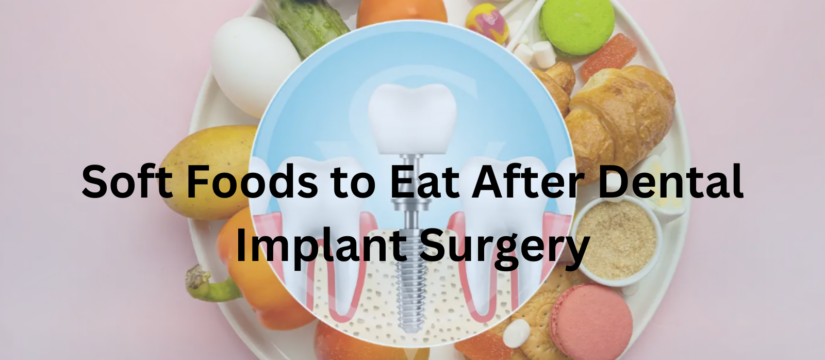
Eating Comfortably After Dental Implant Surgery
Recovering from dental implant surgery requires some adjustments, especially when it comes to eating. Many patients worry about what they can eat without causing discomfort or affecting the healing process. If you are looking for professional advice, a Dentist Rockville MD can provide guidance on how to maintain proper nutrition while protecting your new dental implants.
A proper diet plays a major role in recovery, helping to reduce irritation, prevent infection, and support tissue healing. Choosing the right foods will keep your mouth comfortable and allow you to enjoy meals without complications.
Why Soft Foods Are Important
Dental implant surgery involves placing a post into the jawbone, which requires time to heal. Hard, crunchy, or sticky foods can put unnecessary pressure on the implants, increasing the risk of complications. Sticking to soft foods helps to:
- Minimize irritation to the surgical site
- Reduce the chance of implant failure
- Maintain nutrition without excessive chewing
- Promote faster healing and comfort
Patients should plan to eat soft foods for at least a week or longer, depending on how their mouth heals. If there are concerns about what foods are suitable, consulting a specialist in Dental Implants Rockville can help ensure a smooth recovery.
50 Soft Foods to Eat After Dental Implant Surgery
Finding enjoyable yet safe foods can be a challenge. Below is a variety of options that are both nourishing and gentle on the mouth.
Dairy Products
- Yogurt (plain or fruit-blended)
- Soft cheeses (ricotta, cream cheese, cottage cheese)
- Pudding
- Milkshakes
- Smoothies (without seeds or hard pieces)
- Ice cream (avoid crunchy or hard mix-ins)
Fruits
- Mashed bananas
- Applesauce
- Soft peaches (peeled and mashed)
- Ripe avocados
- Canned pears (without syrup)
- Stewed prunes
Vegetables
- Mashed potatoes
- Cooked carrots (soft and pureed if necessary)
- Steamed squash
- Creamed spinach
- Pumpkin puree
- Blended vegetable soups
Protein Sources
- Scrambled eggs
- Soft tofu
- Hummus
- Mashed beans
- Shredded chicken (moist and soft)
- Slow-cooked fish (salmon, tilapia, cod)
Grains and Breads
- Soft oatmeal
- Cream of wheat
- White rice (cooked until very soft)
- Pasta (well-cooked and soft)
- Soft bread (no crusts)
- Pancakes (without nuts or seeds)
Desserts and Snacks
- Jell-O
- Soft muffins (no nuts or seeds)
- Sponge cake
- Custard
- Sorbet
- Marshmallows
Liquids and Broths
- Warm (not hot) chicken or vegetable broth
- Blended soups (tomato, potato, or butternut squash)
- Herbal tea (lukewarm)
- Protein shakes
- Meal replacement drinks
- Fruit juices (without pulp)
Tips for Eating Comfortably
Soft foods should be prepared in a way that prevents discomfort and supports healing. Here are some helpful tips:
- Cut food into small pieces to reduce the need for chewing.
- Eat at room temperature to avoid irritation from hot or cold foods.
- Blend or mash foods if chewing feels uncomfortable.
- Avoid using straws as the suction can disturb the healing process.
- Drink plenty of water to keep the mouth hydrated.
Foods to Avoid
Some foods can slow healing or cause discomfort. It’s best to avoid:
- Crunchy foods (chips, nuts, raw vegetables)
- Hard foods (bagels, tough meats, hard candies)
- Sticky foods (caramel, gum, chewy candies)
- Acidic foods (citrus, tomatoes) that may cause irritation
- Spicy foods that can lead to discomfort
Adjusting to Normal Foods
After the initial healing period, firmer foods can be reintroduced gradually. Start with softer versions of regular meals and increase texture slowly. If discomfort persists, check in with your dental provider for further guidance.
Keeping Your Mouth Healthy During Recovery
Along with eating soft foods, maintaining proper oral hygiene is key for successful healing. Some best practices include:
- Rinsing with salt water to keep the area clean
- Brushing gently with a soft-bristled toothbrush
- Avoiding aggressive rinsing or spitting in the first few days
- Following up with regular checkups to monitor healing
A Smooth Recovery With the Right Diet
A successful recovery after dental implant surgery starts with proper care and a thoughtful diet. By choosing from these 50 soft foods, patients can enjoy meals while keeping their implants safe. If questions arise about nutrition or healing, seeking advice from a professional will help ensure a smooth process. A personalized approach makes all the difference in achieving long-term dental health.

